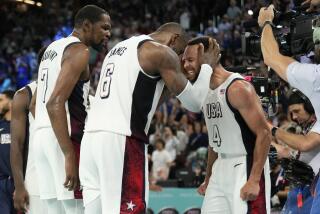Soviets Make Best of Outside Chance : Basketball: Tikhonenko sinks five of nine three-point shots in 92-85 upset of cold-shooting U.S.
SEATTLE — Whether it’s Korean soil or American turf, mud is mud and the Soviet Union basketball team dragged the United States through it once again Tuesday night in a dirty little affair at the Goodwill Games.
This is progress, American style: Two years after Seoul--when Hersey Hawkins couldn’t play and Danny Manning couldn’t score and a fully stocked Soviet team pulled off an 82-76 upset--the Soviet Union shows up without three starters and one republic, the United States shows up without John Thompson and the final score is USSR 92, USA 85.
Political strife back in the mother country was supposed to have left the Soviets ripe for retribution. When the rim-rattling republic of Lithuania declared its independence, center Arvidas Sabonis and guards Sarunas Marciulionis and Rimas Kurtinaitis declared their ineligibility--leaving the Soviet national team with but one returnee from its 1988 Olympic gold medalist.
But what a one.
Forward Valeri Tikhonenko remains a master at a long-lost American skill--the outside jump shot--and the United States’ inability to either defend it or counteract it cost them again in the world basketball standings, superpower division. Tikhonenko made five of nine three-point shots en route to 30 points, the U.S. team countered with a piddling three-for-13 and a flukish night at Seoul has taken on the distinct look of a trend.
Before 1972, the United States had never lost a basketball game to the Soviet Union. Now, the Americans have lost three--two in a row since 1988.
Mike Krzyzewski, coach of the U.S. squad, got to be John Thompson for a day, an experience he clearly disliked. Thompson will always be remembered for the shooting guards he didn’t bring to Korea, for the full-court press he should have left at home and for the bronze medal that should have been gold.
In the postgame interview room at the Seattle Center Coliseum, someone got right to the point.
“Now do you know how John Thompson felt?” asked a foreign accent.
Krzyzewski frowned.
“It’s not the same,” he said. “I did not play in the Olympics. I don’t like to lose any game, whether it’s the Russians or Virginia. This is a totally different competition. No, I don’t know how John Thompson felt.”
Clearly, though, a tone had been set.
“Are you embarrassed to lose to the Soviet Union?”
For the first time all night, an American got defensive.
“Are you embarrassed to ask that question?” Krzyzewski said, glaring straight ahead. “I think that’s a . . . question.
“These are 20-year old kids, trying their hardest. You’re trying to put the weight of the whole country on them. They’re kids, playing against grown men.”
Mark Randall, the Kansas forward seated two chairs away from Krzyzewski, looked at the questioner and asked, “Should we be embarrassed to lose to the Soviet Union?”
Krzyzewski claimed he had learned history’s lesson and stocked his roster with long-distance gunners. Georgia Tech’s Kenny Anderson was here. So was Arkansas’ Lee Mayberry and Todd Day.
“We have good perimeter shooters,” Krzyzewski insisted.
But in Monday night’s Goodwill Games opener, the United States missed all 10 shots from three-point range and had to sweat out a 100-94 victory over Puerto Rico. It was an ominous display. The next night, Mayberry missed all five of his three-point attempts, Day was one for three and the entire team was three for 13.
That’s three for 23 so far in the tournament, a different kind of long-range missile disarmament.
By contrast, the Soviet Union, led by Tikhonenko, made eight of 15 three-pointers, which was better than the Soviets’ overall field-goal percentage of .430.
“Tikhonenko was fantastic,” Krzyzewski said. “We knew that going in. He’s played in an Olympics, he has experience with three-point shooting and he’s so big (6 feet 9 1/2), he spreads us out--and still hits the shot.”
Said Soviet Coach Valdas Garastas: “We had only one player back from the Olympic year. . . . Our team got together in May. We have practically as new a team as the Americans have.”
The best news for the United States Tuesday was that the defeat came during round-robin play. Tonight, the Americans will play Italy and a victory would keep them in contention for the gold medal.
Which is why Garastas wasn’t revealing any trade secrets when asked about the Soviets’ stifling defense against the American outside shooters.
“We had a certain tactic for the game,” Garastas said.
“But I can’t tell you. We don’t know. Maybe we meet them again.”
More to Read
Go beyond the scoreboard
Get the latest on L.A.'s teams in the daily Sports Report newsletter.
You may occasionally receive promotional content from the Los Angeles Times.






